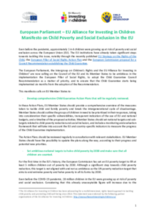Displaying 71 - 80 of 501
This webinar, the fourth in the Shriver Center's Spotlight on the Foster System series, focused on intersections between the healthcare and foster systems.
This article explores this workshop in terms of its relationship with the daily lives of participants, based on one year of fieldwork focused on families with young children in a low-income neighbourhood in Santiago.
In this series of critical conversations, experts share their insights about racism, colonialism, patriarchy and power as they affect children and families around the world.
This manifesto calls on the Council of the EU and its Member States to be ambitious in the implementation the European Pillar of Social Rights, to adopt the Child Guarantee Council Recommendation as a matter of priority, and to ensure that the Child Guarantee starts being implemented six months from the adoption of the Recommendation.
The Reconstructing Children’s Rights Institute is an online institute about dismantling racism, neo-colonialism, and patriarchy in humanitarian and development efforts to protect children and support families.
The overrepresentation of black children in the foster care population represents massive state supervision and dissolution of families concentrated in their neighborhoods. This chapter from Racial Disproportionality and Disparities in the Child Welfare System addresses the social impact of this concentration of child welfare agency involvement on the residents who live in these neighborhoods.
This chapter from Racial Disproportionality and Disparities in the Child Welfare System explores the factors contributing to the disproportionate number of Black children and families in the U.S. child welfare system.
This chapter from Racial Disproportionality and Disparities in the Child Welfare System focuses on the macro level exploring the child welfare system as an explanatory factor using a critical race theory lens.
This paper documents the alignment between the circumstances created by anti-Black racism at institutional, provincial, and federal levels and the seemingly race-neutral eligibility criteria embedded within Ontario child welfare, which results in disproportionate reporting of Black families.
Eurochild, in partnership with its national members hosted a webinar series to bring a children’s rights perspective to Europe’s recovery. Questions addressed: What is an ‘economy of well-being’ & why & how does it prioritise children? Why is tackling child poverty a pre-requisite to sustainably exit the crisis? Why and how does protecting children’s rights strengthen our democracies?

